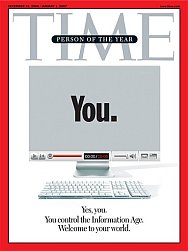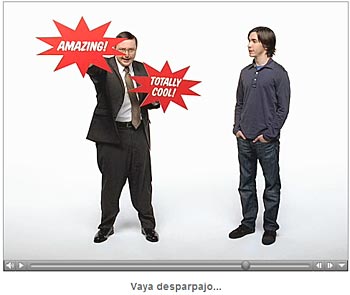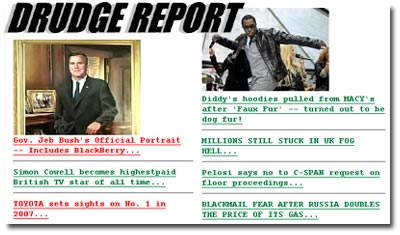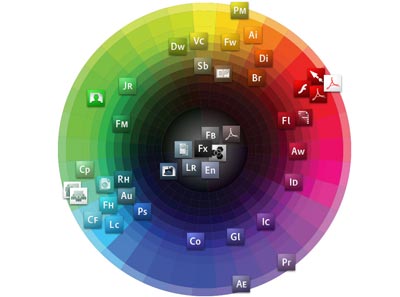 Many of the “You”s are upset with Time magazine’s choice.
Many of the “You”s are upset with Time magazine’s choice.The blogosphere is aflame with ridicule for Time magazine’s choice for Person of the Year, “You,” an allusion to the explosion of user-generated content on the Web.
It feels as if many media types are undergoing a massive freakout, climbing all over themselves to declare the choice as pandering to the audience. “You” is certainly the most politically correct choice, and it’s sure to sell copies and flatter readers. But Time does not deserve ridicule for acknowledging the global culture change that came to a head in 2006.
Ask yourself this question: Would this cover have been truly appropriate in any previous year of human history?
Some were cheering for Iranian president Mahmoud Ahmadinejad, it seems, just because he’s the gutsy choice — the evil guy who will surely cause regional conflict and canceled subscriptions. References to Time’s Hitler and Stalin covers abound. But boldness for boldness’ sake is just plain stupid. While Steve Safran at Lost Remote is correct in that Time‘s choices have seemed “wussified” this decade, this year’s choice is not the same situation as when the magazine lost its nerve and picked Rudy Giuliani over Osama bin Laden in the wake of Sept. 11.
Ahmadinejad hasn’t changed the way my family interacts. He hasn’t particularly given me a better understanding of the world. Nor has he helped end U.S. political leaders’ careers. Neither have Hugo Chavez, Kim Jong Il or Hasan Nazrallah. Save for perhaps Nazrallah, none of them have even invaded anything or been responsible for killing any large amounts of people (that we know of). The bad guys of 2006 next to Stalin and Hitler are like lowly Igor next to Dr. Frankenstein’s infamy.
Donald Rumsfeld was an interesting choice, as was U.N. secretary Hu Jintao representing the rise of Chinese power. But the real face of the Iraq war is President Bush, who has already graced Time‘s Person of the Year cover, as has “The American Soldier.” Hu Jintao isn’t a big shot yet, so there’d be a collective “Huh?” upon seeing the cover in stores. If the guy croaked tomorrow, would the world care?
Let’s look at 2006: The “macaca moment,” when Virginia Sen. George Allen lost a Senate race after being caught on video uttering a racial slur. Mark Foley’s resignation, thanks to several blogs spreading the story about racy correspondence with underage pages. The incredible growth of the time the average person spends on the Web. Comedian Stephen Colbert’s infamous White House Correspondents Association dinner roast, made popular on the Web. Michael Richards’ racist rant, again spreading via the Web. The emergence of Wikipedia, an effort that harks back to the great library of Alexandria.
Marketwatch’s Jon Friedman called Time‘s choice “vague and wishy-washy.” Columbia Journalism Review’s Christian Vachon said the magazine has “insulted its readers.” The Detroit Free-Press‘ Brian Dickerson goes so far as to say Time has “lost its marbles.”
But the “You” concept has impacted nearly every industrialized corner of the world, from the wildly popular OhmyNews in South Korea to the McIntosh Mirror, a news site for a Florida town of 453 people.
In this case, the YouTube guys or Wikipedia founder Jimmy Wales would have made a good alternative choice, if we wanted a clearly definable “person.” But being in the business of user-generated content, I understand that it’s really about the users doing the heavy lifting. Not Jimmy Wales, not the gatekeepers. A mirror on a cover is a brilliant way to illustrate that.
“You” may have been the safe choice. But it was an appropriate choice that will hold up to the scrutiny of the future.
 A couple of Digg‘s most loyal users have been banned because they’ve apparently taken money for posting articles. Along with instances of phony articles appearing, it seems as if Digg has had its hands full containing some of the mayhem that comes along with having a substantial effect on a site’s ad revenue.
A couple of Digg‘s most loyal users have been banned because they’ve apparently taken money for posting articles. Along with instances of phony articles appearing, it seems as if Digg has had its hands full containing some of the mayhem that comes along with having a substantial effect on a site’s ad revenue.




 2) I was the Blockbuster Video game champion in 1994 for the store on West 49th Street in Hialeah, Fla, where I schooled everyone in NBA Jam for the Sega Genesis. Still got the plaque, too. Manufactured atÂ
2) I was the Blockbuster Video game champion in 1994 for the store on West 49th Street in Hialeah, Fla, where I schooled everyone in NBA Jam for the Sega Genesis. Still got the plaque, too. Manufactured at  5) I’ve had an oddball work history: My first job was being the local YMCA’s only lifeguard and swimming instructor. The ONLY person I ever had to save was a woman the size of Martin Lawrence in “Big Momma’s House.” I was also a garlic roll maker, but quit after two days because my girlfriend said I reeked. In college, I worked at a billiard hall, where I fixed bowling machines. Then I tutored NCAA basketball champs Joakim Noah and Taurean Green in a freshman English class. Finally, I was a techie for “
5) I’ve had an oddball work history: My first job was being the local YMCA’s only lifeguard and swimming instructor. The ONLY person I ever had to save was a woman the size of Martin Lawrence in “Big Momma’s House.” I was also a garlic roll maker, but quit after two days because my girlfriend said I reeked. In college, I worked at a billiard hall, where I fixed bowling machines. Then I tutored NCAA basketball champs Joakim Noah and Taurean Green in a freshman English class. Finally, I was a techie for “ Is there a possible trend brewing here? Yahoo! News
Is there a possible trend brewing here? Yahoo! News 
 If you’ve ever tried making one of those CSS boxes, you’ll know it’s a pain in the rear. Now you pop in how rounded you want it and what color, and you’ve got yourself a box! The creators of RoundedCornr have created some majorly good karma for themselves. As
If you’ve ever tried making one of those CSS boxes, you’ll know it’s a pain in the rear. Now you pop in how rounded you want it and what color, and you’ve got yourself a box! The creators of RoundedCornr have created some majorly good karma for themselves. As